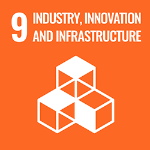About Industry, Innovation and Infrastructure
Build resilient infrastructure, promote inclusive and sustainable industrialisation and foster innovation.

We work towards the UN's Sustainable Development Goal 9 - Industry, Innovation and Infrastructure, to create a better and fairer world.
The 2030 Agenda for Sustainable Development was adopted in 2015 by all United Nations member states. It provides a blueprint for peace and prosperity for people and the planet.
Find out more about our work across all the UN's Sustainable Development Goals.
Build resilient infrastructure, promote inclusive and sustainable industrialisation and foster innovation.

Stirling Management School has focused one of their key research themes around SDG Goal 9 and conducts research which explores changes in organisational structures and the processes, systems and governance mechanisms that drive sustainable economic development and wellbeing through their research on:
Human-centric decisions and human rights are central to a raft of new AI regulation proposals from University of Stirling expert in risk management and AI, neurotechnology and robotics, and leading adviser to the United Nations, Markus Krebsz.
The proposed way forward for governments assert that machines should not trump humans when it comes to products with embedded AI and other digital technology.
The paper also calls for governments to put human rights – in particular safeguards to protect children – at the heart of any regulatory framework, alongside the environment, sustainability and reducing the global digital divide.
The paper makes the case for the widespread and globally aligned use of common international standards and compliance and suggests that only AI-embedded products that comply with these standards are put on national markets.
Business Start-Up and Growth is a core module for MSc Business and Management and an optional choice on other courses. A local entrepreneur provides a valuable guest lecture that provides a practitioner perspective. Workshops are a vital aspect of the delivery and student learning. Groups evaluate an entrepreneurial business, and an individual assignment focuses on self- reflection.
Selected Masters cohorts have the opportunity to undertake an applied consultancy project instead of a final dissertation. Students work with local businesses to consider the role of business in society in active organisational problems. Many of the briefs from local organisations have PRME (Principles for Responsible Management Education)-related challenges.
Between these consultancy projects and Masters dissertations, around 30 students worked on a topic directly relevant to responsible business in 2022. Projects have taken place with organisations such as:
The University of Stirling, as a Small Business Charter accredited institution, is one of a select number of partners delivering the UK Government's Help to Grow: Management Course. The course is designed for SME senior managers seeking to boost their business’s performance, resilience and long-term growth.
The cost to attend is 90% funded by the UK Government and consists of 12 sessions delivered by leading academics from Stirling Management School, peer-to-peer learning amongst fellow SME leaders, plus 10 hours of tailored mentoring from external business experts.
The course aims to enhance participants' management and strategic capabilities whilst assisting them with producing a growth plan specific for their business and building resilience to future shocks.
The Enterprise team at the University has increased activity in promotion of Knowledge Transfer Partnership (KTP) - funded by Innovate UK - which has resulted in three new awarded projects.
Based on campus at the University of Stirling Innovation Park, The Hive is the institution’s dedicated business incubator, a co-working space with wrap-around support to enable the launch and growth of responsible start-ups of all kinds.
Championing the University’s ethos, The Hive encourages founders to make a difference in their communities and wider society by embedding sustainable and responsible business practices.
The University’s Enterprise Programme enables students, staff, recent alumni, and eligible community founders to realise their entrepreneurial potential, gain skills, drive innovation, develop commercial solutions, and make a positive difference through business creation.
The programme supports individuals to translate learning, teaching, and research outcomes into real-world impact through our comprehensive services and vibrant founder community. Participants can access a range of training, events, services, networking, and funding opportunities to develop entrepreneurial skills, test ideas, create and grow new business ventures, and commercialise research.
Through its delivery of a range of transformational programmes within the Stirling and Clackmannanshire City Region Deal, the University of Stirling’s Enterprise Team works closely with colleagues and stakeholders to support business start-up activity within the region.
Stirling Management School is a key partner alongside Business and Enterprise Support stakeholders across the Forth Valley region in sponsoring and judging the ‘Dragon’s Den’ style HEAT competition. HEAT stands for Highlighting Entrepreneurship All Together and is open to businesses who have been trading for less than two years or entrepreneurs who have an idea that they want to translate into a successful business.
Partnering with other businesses throughout the region to offer prizes to winning entries and business support for new local businesses, the University is helping to develop the next generation of start-up businesses in the local community.
The Stirling Management School research group for Scale Up Regional Growth and Entrepreneurship (SURGE) works to effectively coordinate the various research projects working with and for SMEs and to better enable SMEs and entrepreneurs, as well as policymakers, to engage with our work.
Success measures for these initiatives include the number of businesses engaged with, responses from evaluation surveys on impact (e.g. how many new businesses/new jobs created). For example, colleagues in this group (Knox, Hruskova) have worked with Scottish Government in relation to entrepreneurship and SMEs in the creative and cultural industries.